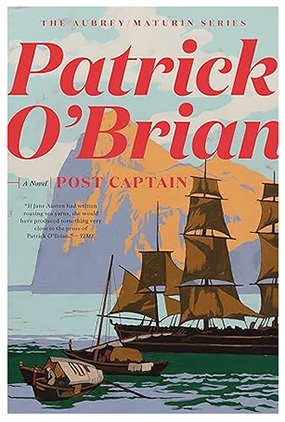[ O'Brian / Post Captain ]
Patrick O'Brian (1914 - 2000), born Richard Patrick Russ, was an English novelist, biographer, poet, short-story writer, and translator, best known for his 20-volume series of scrupulously researched historical novels following the exploits of "Lucky" Jack Aubrey, a British Naval officer, and his friend and companion Dr Stephen Maturin, during the Napoleonic Wars at the turn of the 19th Century. The popularity of these novels was considerably boosted by the award-winning 2003 film Master and Commander: The Far Side of the World, starring Russell Crowe and Paul Bettany and directed by Peter Weir, which brought O'Brian's most famous literary characters vividly to life.
The second novel in the series, Post Captain (published 1972), contains two passing references to Newfoundlands. The first is the typical metaphoric usage: one of the ship's officers comes below decks "dripping like a Newfoundland dog." (Chapter 8)
The second reference occurs during a ship-board dinner hosted by Jack Aubrey when one of the ship's officers, seeing how another passenger's persistent questioning of Aubrey about his battle experience has started to become annoying, "turned the conversation back to animals aboard. Dogs in ships he had known: the Newfoundland that so lovingly brought a smoking grenade. . . ." (Chapter 12)
That anecdote is never explained, although O'Brian may well have been thinking of Gander, Canada's most famous Newfoundland, who was the mascot of the Royal Canadian Rifles during World War II. During the Battle of Hong Kong, Gander picked up a grenade that had been thrown toward his unit by Japanese soldiers; Gander picked up the grenade and was trotting toward the Japanese when the grenade detonated. Gander's story is told in several works that are discussed here at The Cultured Newf: A Dog Named Gander (2017) by Sgt. Major George S. Macdonell and Sue Beard, and Sergeant Gander: A Canadian Hero (2009) by Robyn Walker.
